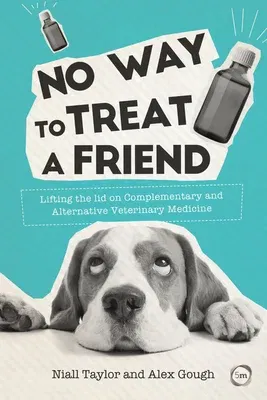"No Way to Treat a Friend" is an informative and readable exposÃ?Â(c) of
Complementary and Alternative Veterinary Medicine (CAVM). Written in an
accessible style and illustrated with stories and real-life cases from
veterinary practice, this book is a counterweight to the mass of 'pro'
literature in existence which uncritically promotes CAVM without
consideration of whether or not it could be harmful to an animal
companion. The authors, both practicing veterinary surgeons, take a
close look at how animals can appear to respond to treatment, even when
it is ineffective. Individual alternative practices are
examined-including homeopathy, acupuncture, raw diets, and the
anti-vaccination lobby-to find out if they stand up to scrutiny. With a
thoroughly scientific focus, this is not an attack on different belief
systems but a rigorous analysis of the facts, and a consideration of
typical CAVM arguments. "No Way to Treat a Friend" will be a helpful
reference for those who want to know more about the various therapies
themselves, as well as an invaluable resource for veterinary
practitioners and anyone with an interest in animals and their welfare.
Niall Taylor is veterinary surgeon working in rural Somerset, England. A
general practitioner, he also has a long-standing interest in critical
thinking and how it relates to complementary and alternative veterinary
medicine. He is a founding member of the Campaign for Rational
Veterinary Medicine and runs the rationalvetmed.net website. Alex Gough
is the Head of Medical Referrals at Bath Veterinary Referrals, and is
the author of the veterinary textbooks "Differential Diagnosis in Small
Animal Medicine" and "Breed Predispositions to Disease in Dogs and
Cats", both of which have been translated into multiple languages.
*** " Veterinarians who cringe when their clients refuse
vaccinations, feed their pets raw food, and consult animal psychics will
relish "No Way to Treat a Friend: Lifting the Lid on Complementary and
Alternative Medicine". The authors 'lift the lid' on unsavory
alternative practices, some of which have successfully escaped scrutiny
so that they now appear in veterinary school curricula." --Journal of
the American Veterinary Medical Association, Vol. 252, No. 6, March 15,
2018(Series: Evidence Based Science) [Subject: Veterinary Medicine,
Holistic Pet Care]

